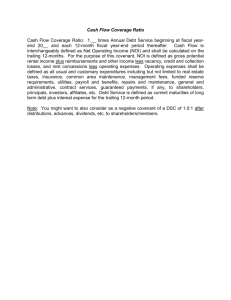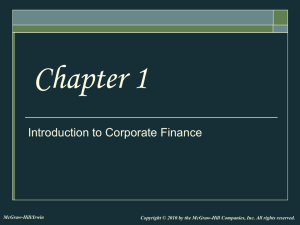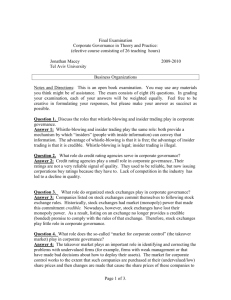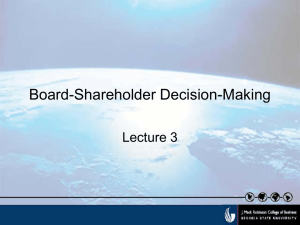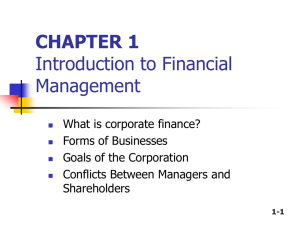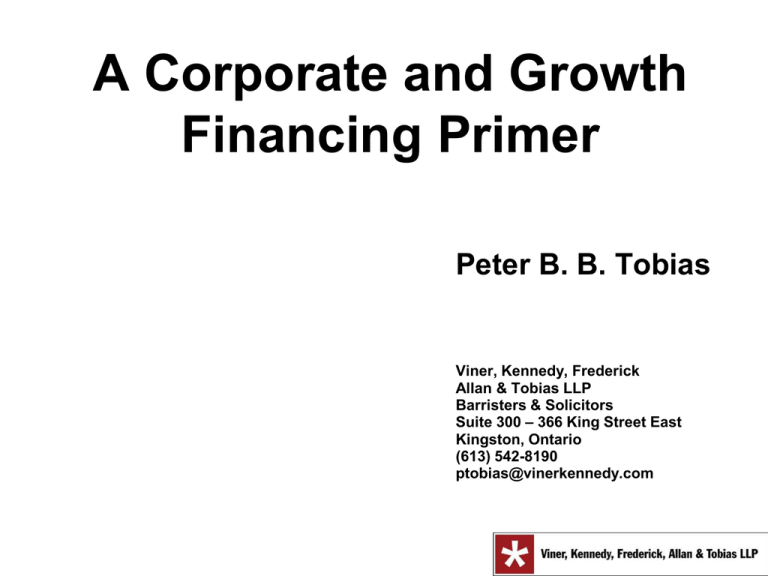
A Corporate and Growth
Financing Primer
Peter B. B. Tobias
Viner, Kennedy, Frederick
Allan & Tobias LLP
Barristers & Solicitors
Suite 300 – 366 King Street East
Kingston, Ontario
(613) 542-8190
ptobias@vinerkennedy.com
Legal Considerations for a New Venture
Sole Proprietorship
• basic taxation - on individual’s own tax return
• extent of liability - unlimited
• signing e.g. Joe’s Pizza
_____________________
By: Joe Pepperoni
Partnership
• basic taxation – on partner’s tax returns as allocated
• extent of liability - unlimited
• signing e.g. Joe’s Pizza
_____________________
By: Joe Pepperoni
Legal Considerations continued…..
Limited Partnership
• passivity requirement – needed to avoid liability
• basic taxation - on returns of limited partners as
allocated
• extent of liability – limited for limited partners – unlimited
for general partner
• signing e.g. JB’s Pizza Limited Partnership
_____________________________
By: Joe Pepperoni, General Partner
Incorporation
• Federal
• use of name
• extra reporting
Legal Considerations continued…..
• Ontario
• basic taxation – separate entity
• limitation of liability – limited liability for
shareholders
• perpetual existence
• signing eg. JB’s Pizza Inc.
_____________________
By: Joe Pepperoni, President
Incorporation - Ontario
Certificate and Articles of Incorporation
Business Corporations Act of Ontario (1990), as amended
Creates a separate legal entity
Should cost about $1500-$2000, depending on structure
• name search
• drafting of Articles
• submission of forms
• payment of government fees
• preparing organizing proceedings and By-laws
• minute book, share books and seal
Articles of Incorporation
Identifies as public information:
• initial directors of the corporation
• the minimum and maximum number of
directors
• legally distinct name
• may place restrictions on the types of business
the corporation may carry out or powers the
corporation may exercise, but regularly does
not
• no public record of shareholders in Ontario
Organizing Proceedings and By-laws
Put in place to give the corporation a means
of carrying on business
By-laws set out general operating framework
for internal governance
Often modified by a shareholders’ agreement
The Corporate Governance Hierarchy
Shareholders
elect
Directors
elect
Officers
hire
Employees
Shareholders do not own the assets of the corporation
Shareholders exercise their influence indirectly through the
election of directors
Directors are responsible for policy making and overall
operation and direction
Officers and employees are responsible for day to day
operations
Shareholders’ Agreement
Describes the contractually agreed rules to govern the
corporation relating to, for example:
Business conduct
Rights, obligations and restrictions of officers, directors
and shareholders
Financing obligations
Restrictions of future issuance and/or transfers of shares
Stock control provisions, for example
• right of first refusal – soft or hard
• shot gun buy-sell
• options to “call” or “put”
• “piggy back” or “tag along”
• “drag along” or “come along”
Shareholders’ Agreement continued…
Options or rights to deal with
• the death of a shareholder
• the disability of a shareholder
• a shareholder ceasing to be an employee
• a shareholder becoming insolvent or bankrupt
• a shareholder losing an important license or
qualification
Alternative Dispute Resolution
Mechanisms
Mediation
• usually non-binding
Arbitration
• binding
• non-binding
Other Common Provisions
Confidentiality provisions
• duration
• scope
• exceptions
Non-competition/non solicitation provisions
• duration
• scope
• geographic reach
• business reach
The Business Black Box
Shareholders
Directors
Strategy and Policy
Officers
Execution of Strategy
Debt Capital
Employees
Supplies
Real Property
Equity Capital and
Governance Control
Product Output
Business
Corporation
Service Output
Claims for
Payment
Revenues
Corporate Finance Risk Return Matrix
Voting Rights
Rate of Return on
Investment
Security of
Return on
Investment
Security of
Return on Capital
Government
Liens
None
N/A
First
High
Secured Debt
(Fixed)
None
Low and Fixed
High
High
Secured Debt
(Floating)
None
Low and often
variable
High/Mid
High/Mid
Unsecured Debt
None
Risk adjusted (eg.
Junk Bonds) and
fixed
Ranks after
secured
Ranks after
secured
Account or Trade
Debt
None
Generally nil to low
Ranks last of debt
Ranks last of debt
Preferred Shares
Cumulative
Dividends
None (sometimes
after failure to pay
several dividends)
Often fixed
Ranks as highest
equity but behind
debt
Ranks as highest
equity but behind
debt
Preferred Shares
Non-Cumulative
None
Often fixed – can
be variable
Ranks as highest
equity but behind
debt
Ranks as highest
equity but behind
debt
Common Shares
Yes
Variable (what’s
left)
Last
Last
Typical Stages of Growth
Company Financing
Founder funding and contribution of value
Friends, family and existing business contacts
Third party angel or seed investors
Broad exempt offerings by offering memorandum
Institutional investors and venture capital
Capital pool investors or reverse take-overs
Fully marketed initial public offering
Typical Legal and Business Issues
that Arise at Each Stage
Access to capital and securities exemptions
Dilution of control, value and earnings and methods
of expression of these changes
Practical and legal investment minimums
Listing requirements on junior exchange
Ongoing reporting requirements to support secondary
trading
Role of Intellectual Property
Often the core value
Inter-relation with know-how
Scope of patents in the field may dictate appeal as an
investment
For unpatentable intellectual property confidentiality
and rigour of practice can determine whether a
financing can be done
Containing Intellectual
Property Value
Create a document trail of ownership
Lab Books and Programming Notes
Employment Agreements
Consulting Agreements
Ensure the trail of invention and ownership is
captured
Keep things secret and confidential – it may be all the
protection you can get
Selecting Legal Counsel
Matching personalities
Background and experience – not all the same
Cost and specialty is a trade-off
Short term/Long term
Value added to bargaining range and “market terms”
1 Nothing in this document should be taken to be or relied on as legal advice. Readers are
urged to seek professional legal advice on the particular issues which concern them.
Members of our firm would be pleased to assist readers with specific legal issues.
© Peter B. B. Tobias 2003-2012, all rights reserved.




